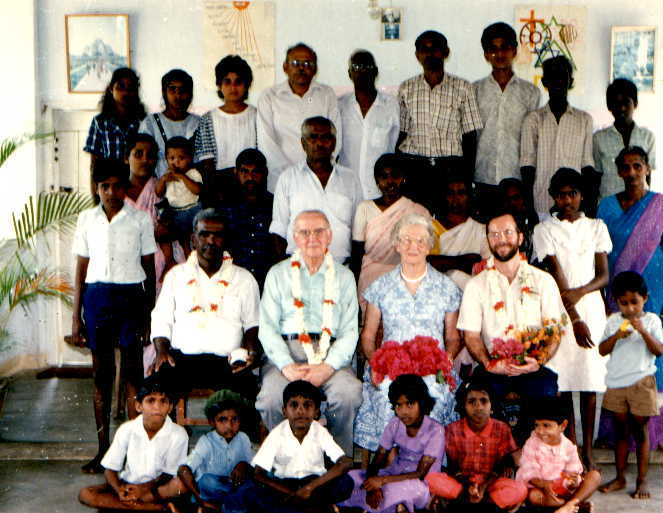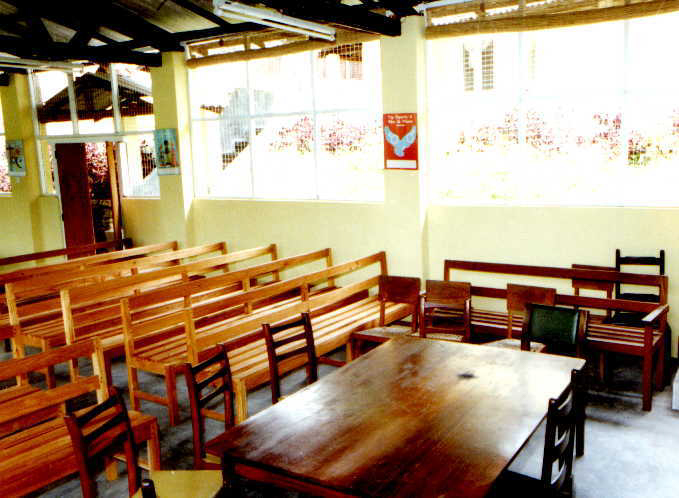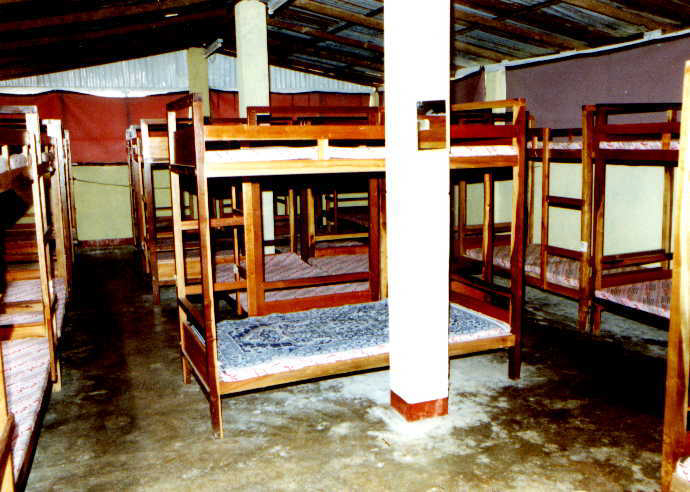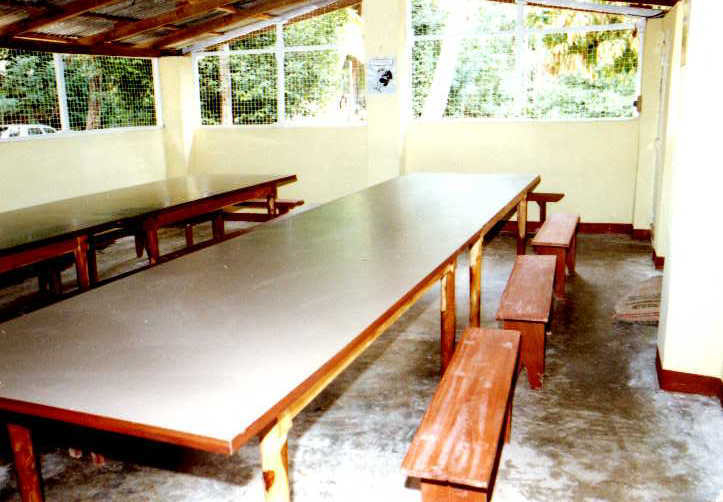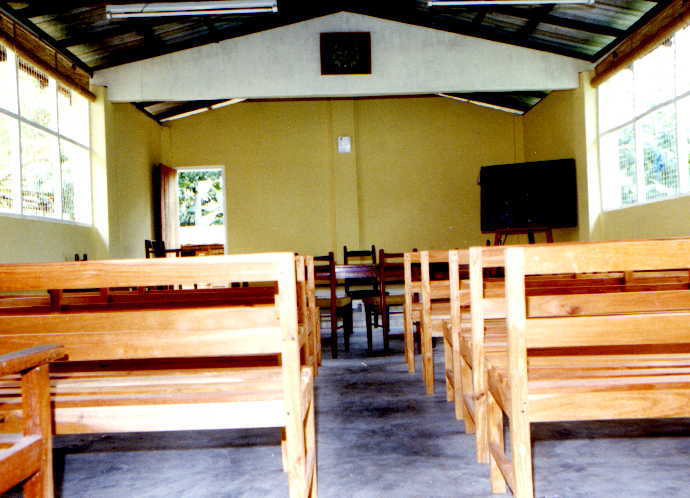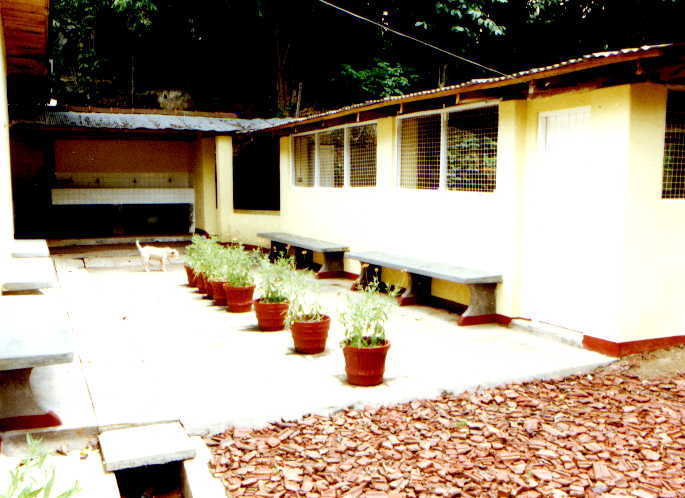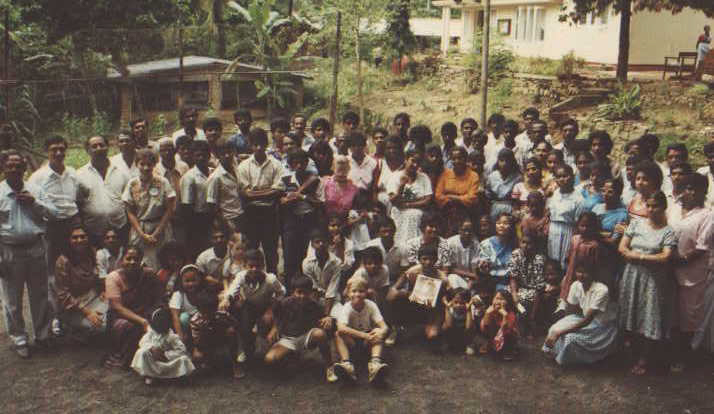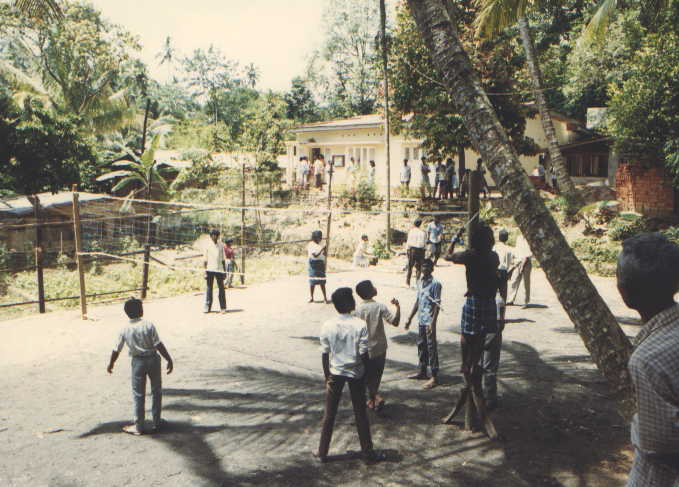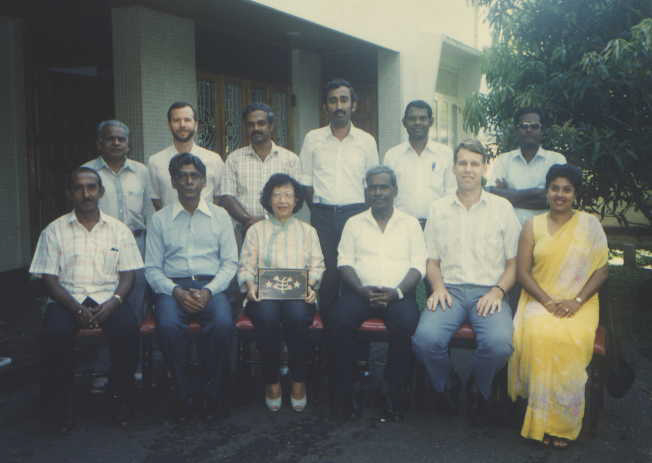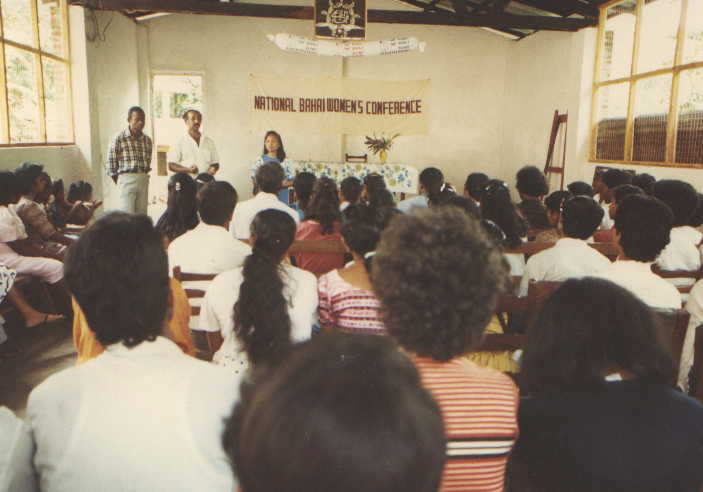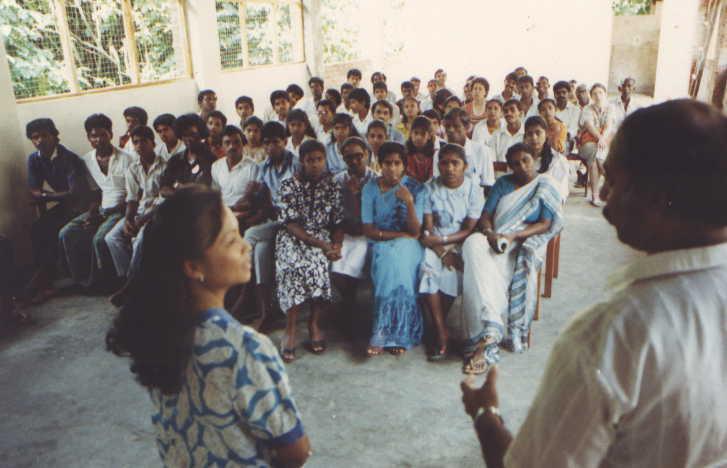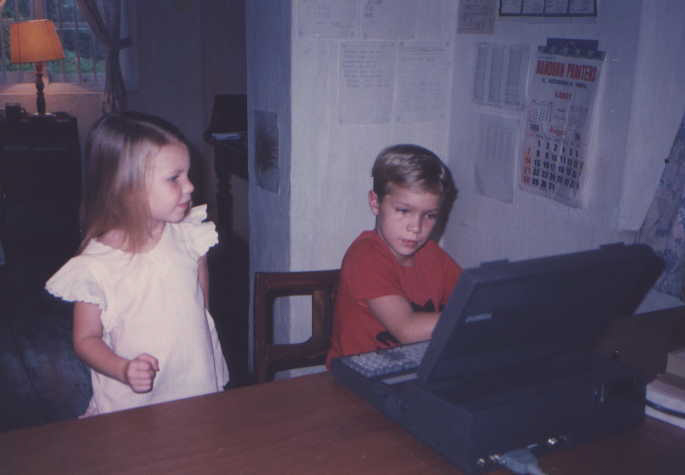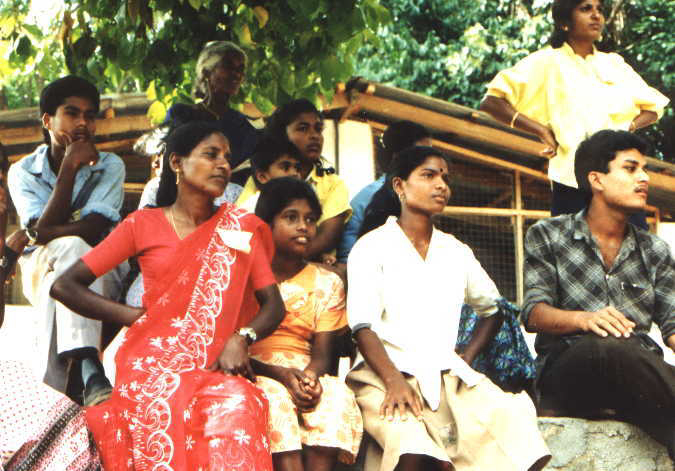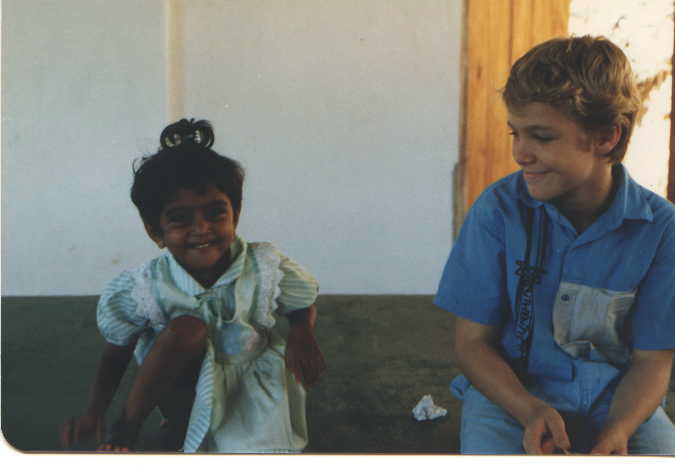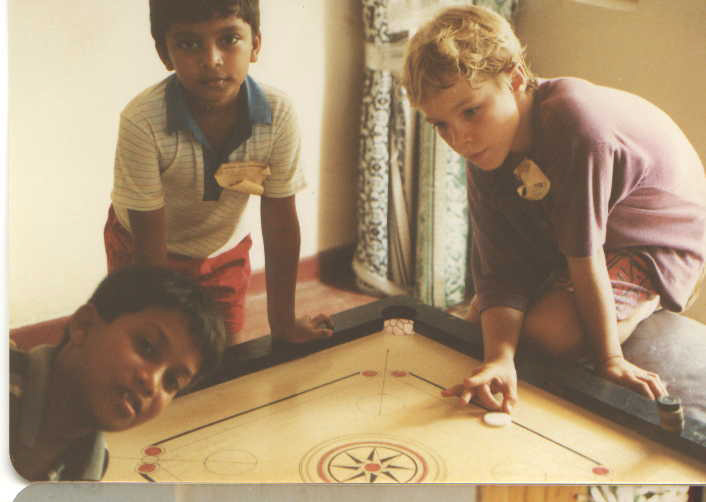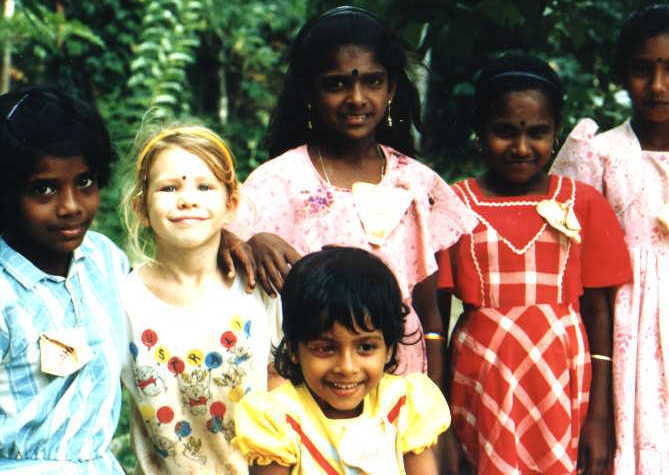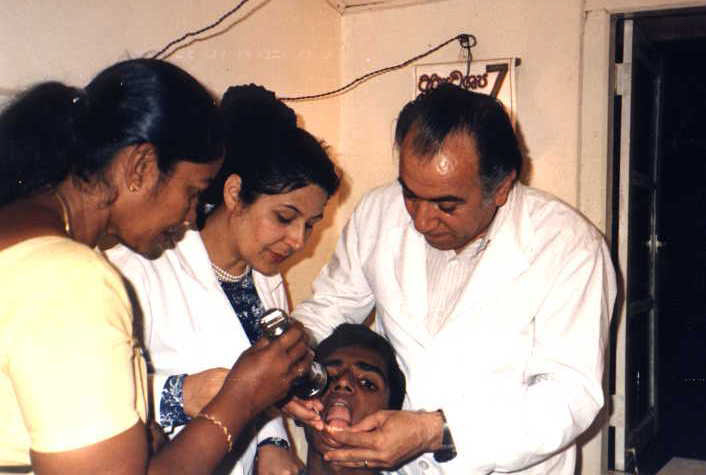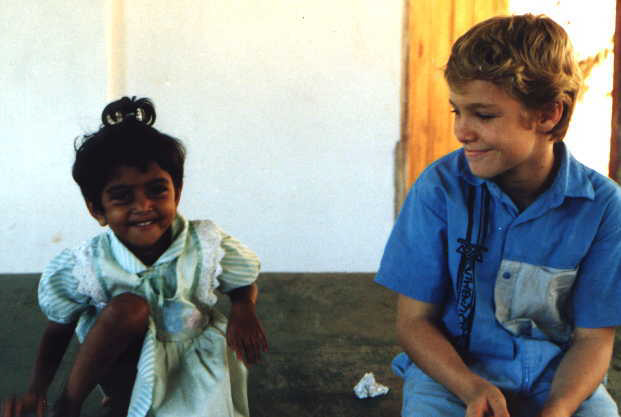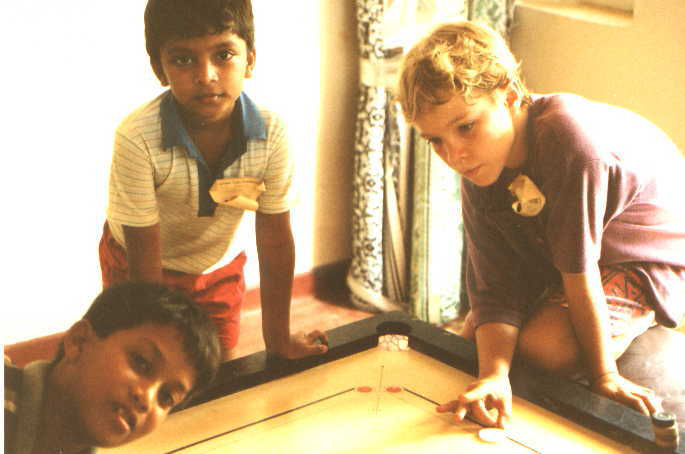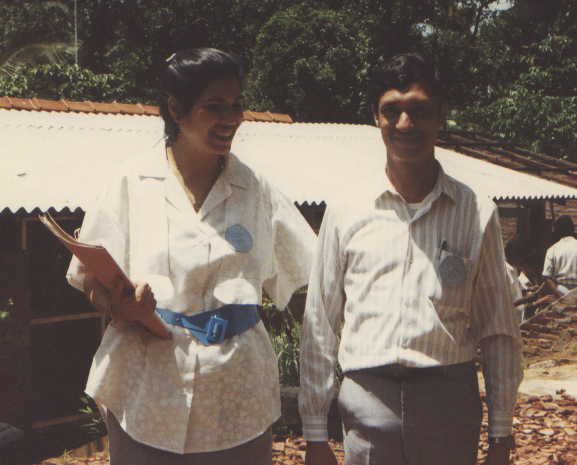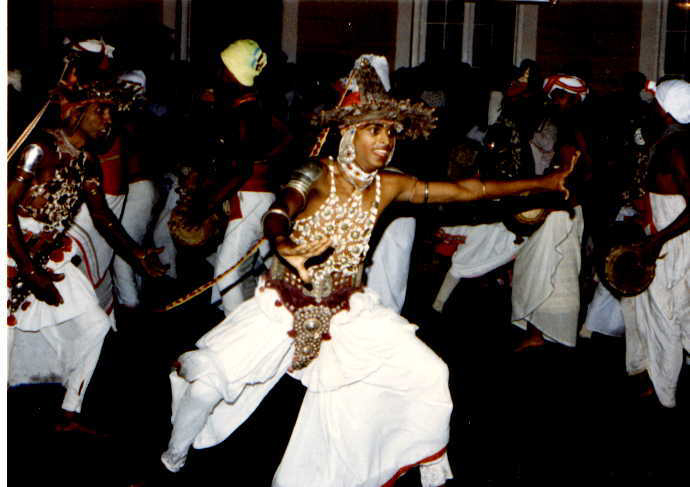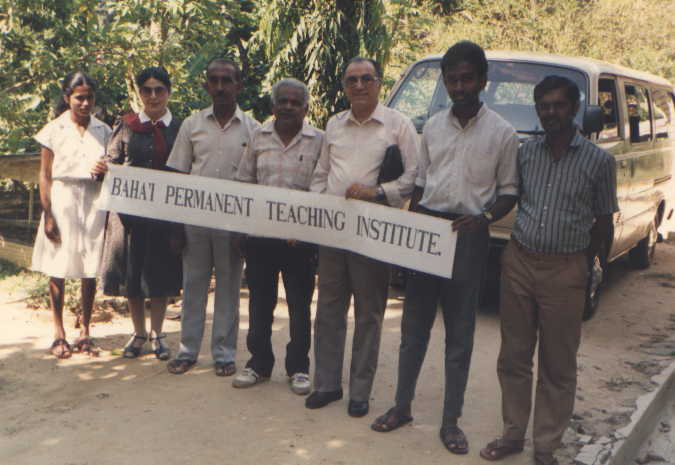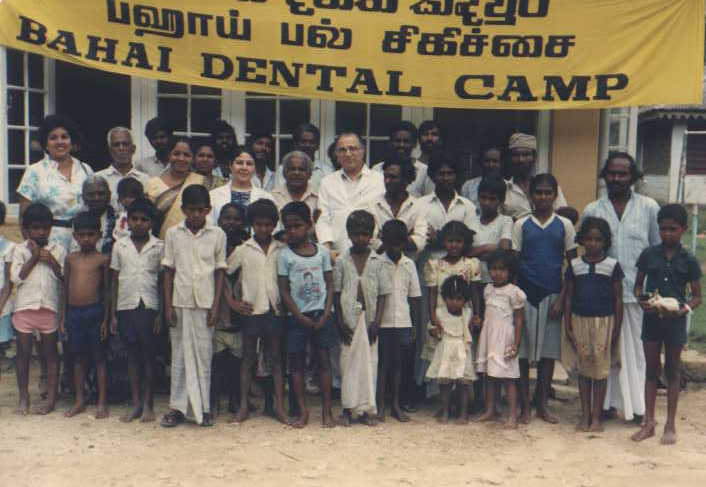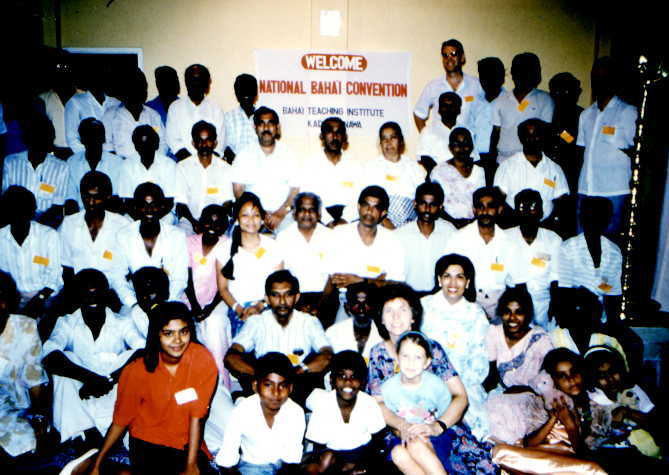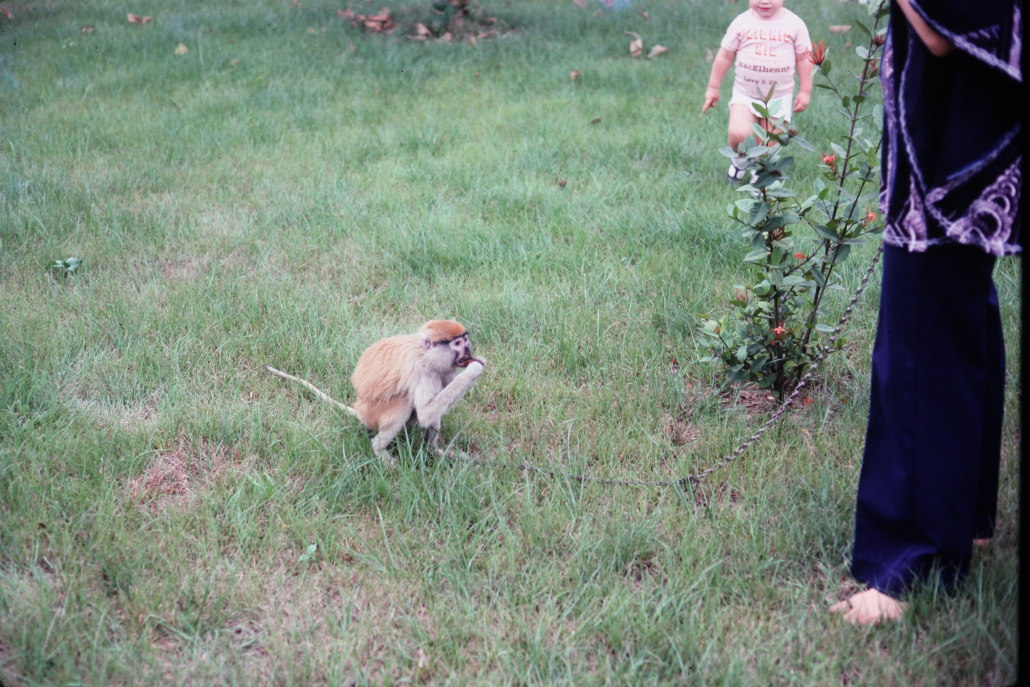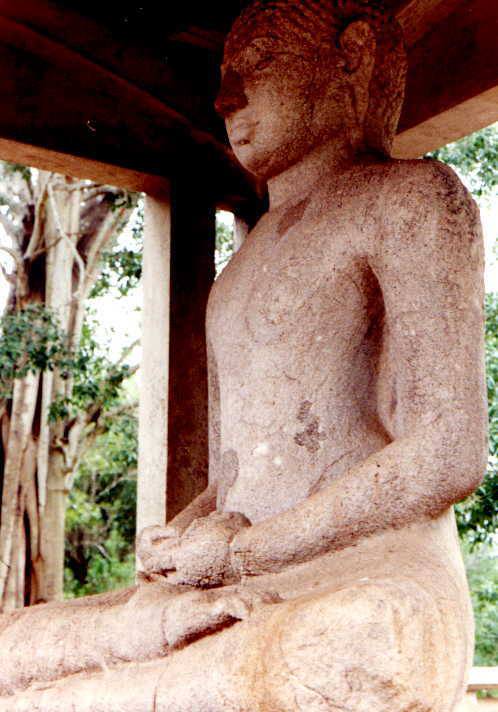Carolyn Ann Reusche Peterson
Carolyn and I met at a Baha’i Fireside at the home of the Huddlestons. Together with a group of Baha’i youth, we participated in various Baha’i activities in Virginia, North and South Carolina, Washington, DC, Massachusetts. We attended a conference in Oklahoma City. The group from Northern Virginia spent a lot of time together. Many of us had started university but this conference brought us together. At the end of the conference, when saying good-bye, I kissed Carolyn. That was the start of our life together. A few months after the conference, Carolyn transferred to Virginia Tech where I was attending university, and soon thereafter we were married. This was followed closely by pioneering to Haiti, where Aileen was born. Then Nabil arrives in Cote d’Ivoire, and Lua came into the world just prior to Sri Lanka. Most of our life together is about raising children and Baha’i pioneering and that is where most of my memories will be told.
I really don’t remember the first meeting Carolyn. She was a quiet girl at the Huddleston firesides. I suppose we exchanged a few words, but nothing that stands out.
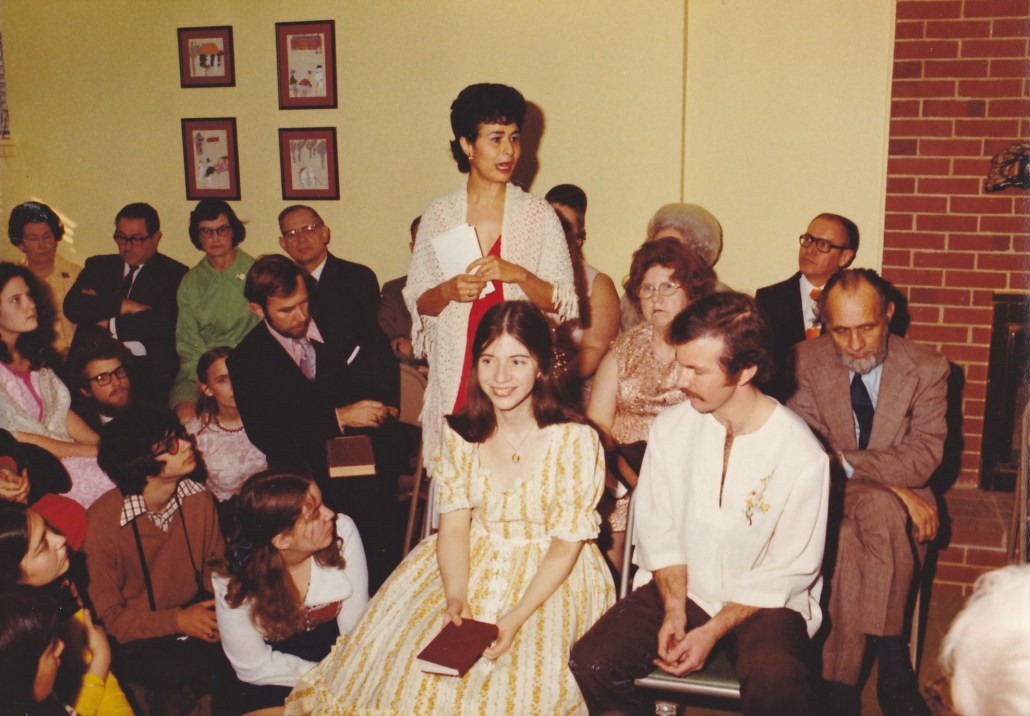
Our marriage, 21 March 1973. Rouhi Huddleston is talking, our friends are sitting on the floor. 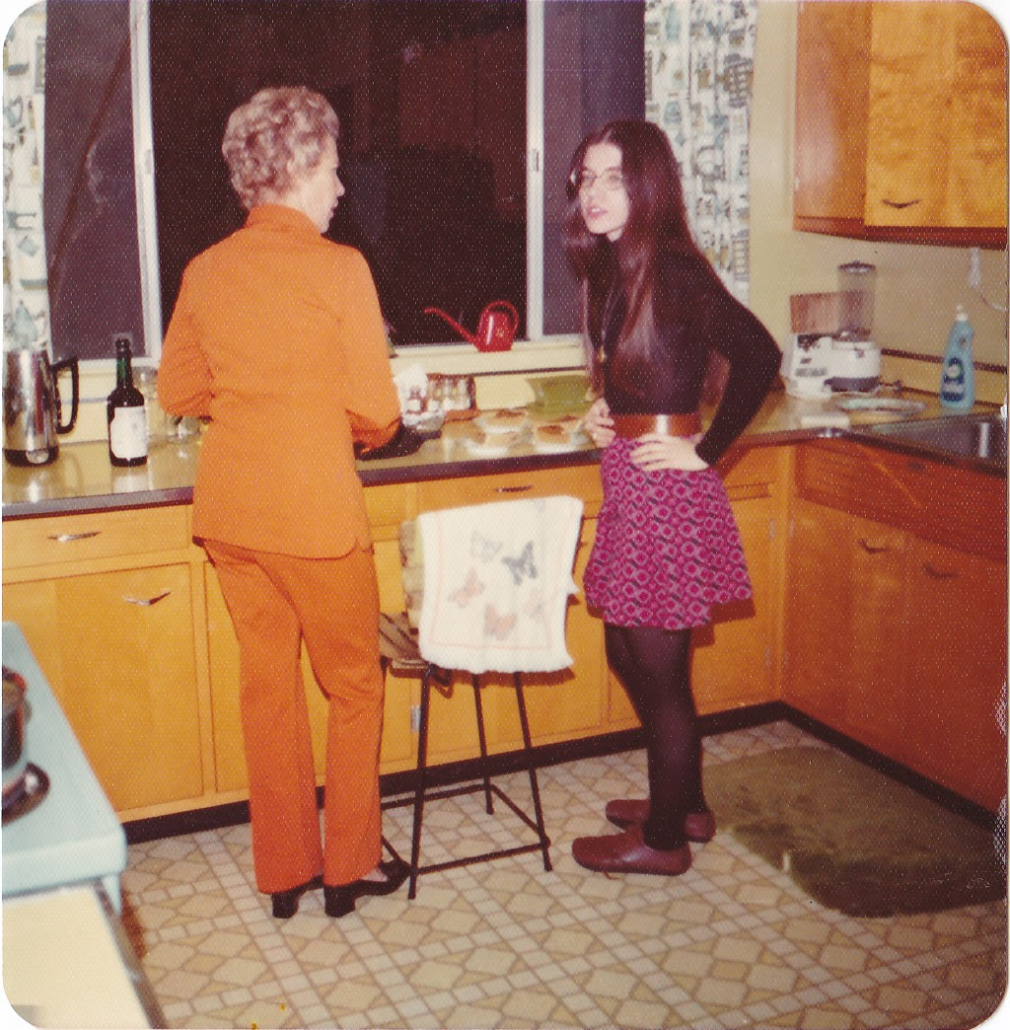
With my mother before our marriage. I asked Carolyn to help my mother when Scott was almost killed in an automobile accident. 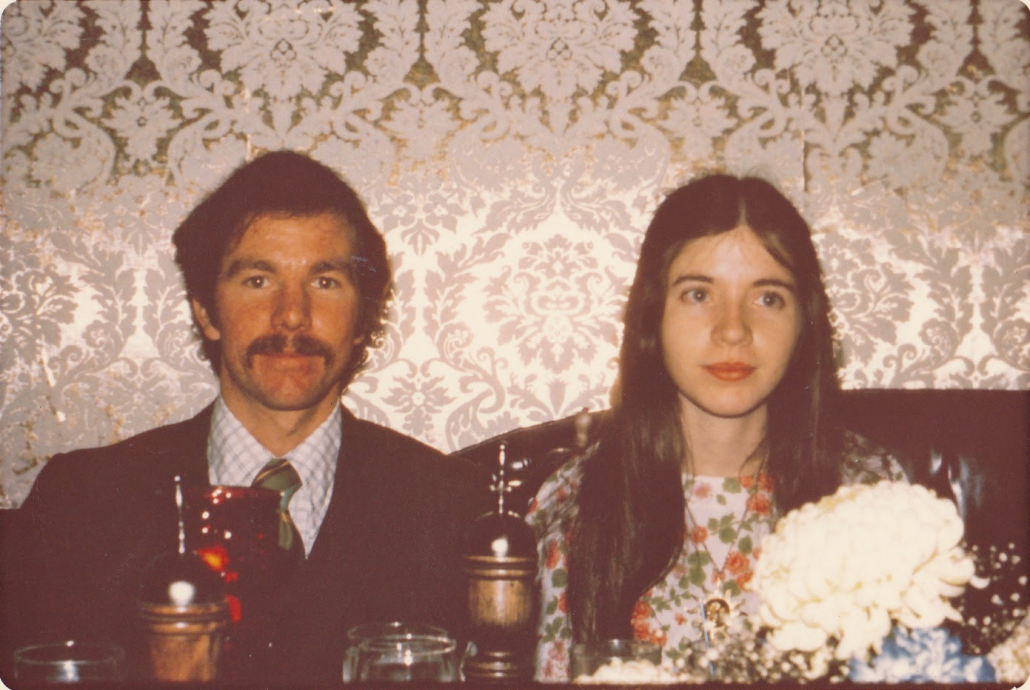
Before the wedding, a dinner with my mother and Ralph. 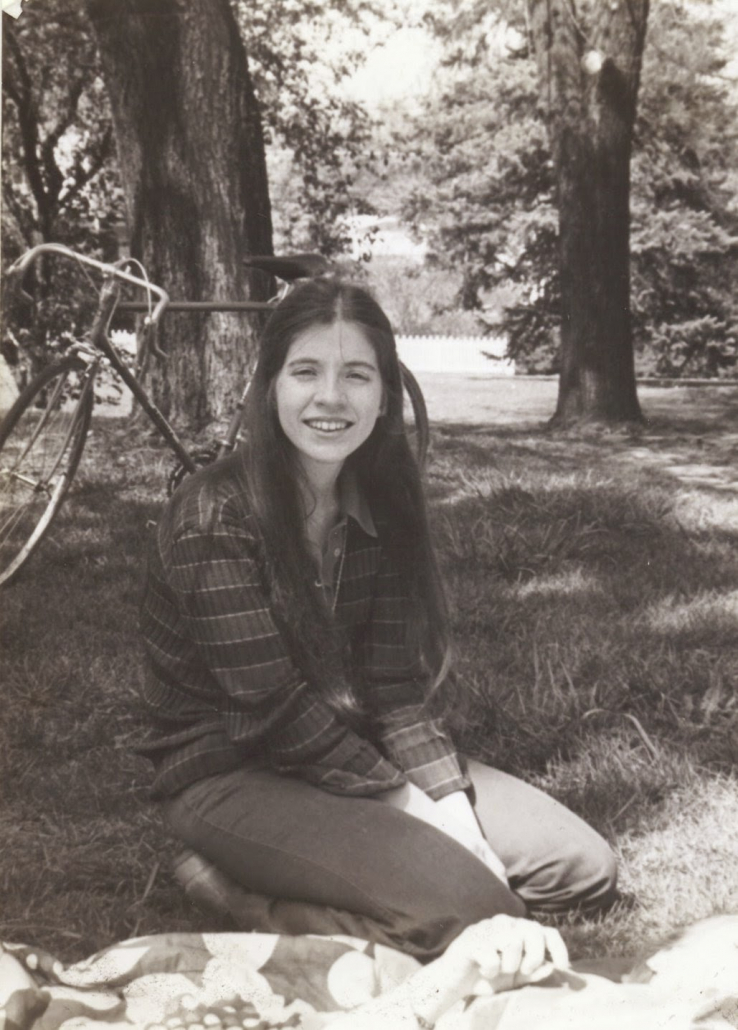
At Virginia Tech, before our marriage.
Carolyn told me that one time I brought a friend of mine to the fireside, Sandra Segal. Sandra lived a few houses from mine between first and fifth grade and we were friends from grade school. I was often in Sandra’s home, and also remember her sisters, Barbara and Shelly, father and mother. Years later I bought a car from her father. I have some childhood memories about playing in the woods with a girl, and playing in a house being built in our neighborhood. I assume this is Sandra. In fact, nearly all of my friends from that period are only remembered in places and events, with faces and other parts of the memory annoyingly missing. Most of my memories from that time are spotted and blurred. I don’t know if that is normal or not.
When Carolyn saw Sandra, attractive and animated like Sandra was (and is), she assumed I was with her romantically, and she told me later that she daydreamed about being with me. I told Sandra about becoming Baha’i, and that by so doing it radically changed my life and even the people I hung out with, for example, motorcycle buddies like Wayne and an ex-navy submariner (Jack Hudson), the brother of a classmate. Wayne thought highly of himself and used to be my primary source for weed, and the ex-submariner (Jack) used to hang out with a group of girls, one of them Kim Pedlar, who has a place in my heart.
After becoming Baha’i I traveled across North America for 9 months on the easy rider trip and returned to find Carolyn and other new friends engaged in various activities— coordinated at the Huddlestons. I returned to Old Dominion University in Norfolk in the fall of 1972 and frequently commuted between Norfolk and McLean and attended a number of Baha’i gatherings throughout the state. For a couple of years, Carolyn and I spent time together in the youth group, including weekend trips to North and South Carolina to participate in the on-going mass teaching programs. But it was never a boyfriend-girlfriend situation. In fact, I heard that Rouhi was trying to match me to another in the group, Betsy Dere (married to another Gary from the same youth group, pioneering in Australia).
In the spring of 1973, I transferred to Virginia Tech and started majoring in Agronomy. Carolyn was at Tufts University. From Virginia Tech and Tufts we traveled to Oklahoma City for the “Third National Baha’i Youth Conference from 20-24 June 1973. A lot of well-known musicians played at the conference, including Seals & Crofts, England Dan & John Ford Coley, Lawrence and Roselle, Don Reed, Clearsign, The Haghighi Brothers, Sher, and Buffie St Marie. It was one of the largest Baha’i youth gatherings at the time, attended by over 4,000 Baha’is. And, in this large group, it is normal to gravitate towards the familiar, and of course, the youth from Virginia grouped together. The conference speakers include at least 2 Hands of the Cause, Ruhhiyeh Khanum and William Sears. The conference was held soon after the first meeting of the International Teaching Centre, held at Bahji in June 1973. All Hands of the Cause were part of the International Teaching Centre.
At the end of the conference, I was preparing to return to Blacksburg, Virginia, and I saw Carolyn sitting in a chair, by herself, and looking rather lonely. So, I went to her to say good-bye and kissed her on the cheek. Nothing more was in my mind when I kissed her, except that she was a friend, and I wanted to show her kindness. For all who think a simple kiss is just a simple kiss, sometimes it is, and sometimes it isn’t. Something started at that moment that ended up in the birth of 3 children and 10 years of international pioneering.
After the 1973 summer youth conference, I returned to Virginia Tech and Carolyn returned to Tufts. We corresponded and occasionally saw each other in McLean. Very quickly, during the fall of 1973, plans were made for Carolyn to transfer to Va Tech. As my life repeatedly demonstrated, events that are set into motion generate their own energy and direction and, although it wasn’t obvious to me at the time, talking with Carolyn about transferring to Virginia Tech was a decision to marry, just not yet consumated.
My transfer to Va Tech is a result of my becoming Baha’i, my motorcycle trip to Mexico, especially the Yucatan, and Belize. On the beach in Belize, I decided to return to the University and prepare for international pioneering. My years at the University were wonderful, to be taken up in another chapter. In the context of my relationship with Carolyn, we started our life in unity and affection in Blacksburg, Virginia.
Virginia Tech and the mountains around the University was one of my favorite places of all time. Many have asked me why I do the work I do, and my answer is of course, because my work in development, both Baha’i development as a pioneer, or socio-economic development as an international consultant, was a life that inspired me. Other options, 9-5 job, a mortgage, 2 cars, and a pension— bored me. I did not want such a life and always refused to be slotted into such a life.
But if I did stay in the States, I would have been wonderfully happy in Blackburg, or Starkville, Bozeman, or any other University town away from the big cities. A perfect life it would have been if my motivations had been different.
Thomas B. Hutcheson, was the Head of the Agronomy Department. To Dr. Hutcheson, I owe my professional life. He is the one who sent me to my first assignment, which leads to the second, and the third, all the way to the present day, non-stop, a direct line that took me around the world. God willing, I managed to do something useful somehow, somewhere. At least I tried.
March 21, 1974. Marriage at the Hayes home. Carolyn made the clothes for the occasion. Rouhi and John Huddleston talked about Baha’i marriage. My mother cried when she observed their influence on my life.
Carolyn moved to Blacksburg in January 1974. I helped her to rent a room in a flat on the 3rd floor in the same building where I was living in the basement. On Naw Ruz, 21 March 1974, we were married. We were both in school. That is pretty fast-moving. From a kiss at a Baha’i conference to relocating, to marriage— pretty fast. I started graduate school at that time and received a graduate stipend for our material needs. Carolyn continued to study, switching majors (which is something she often did).
One funny story is that I used to sleep on the floor before the marriage. I shared an apartment with 2 others, and we each had a bedroom but no real living room. I rented this flat, and then sub-rented to others. These included: Geoff Houghland, Srinivasan, and the “classical guitarist” who practiced all the time. So, my bedroom had to be multifunctional, which meant no bed. Betty felt that her daughter should sleep in a bed, and so she bought one for us.
Later in the year (August 29-September 1, 1974) we traveled to St Louis Missouri. Along with 10,000 Baha’is, we attended the First National Baha’i Conference of the Five Year Plan (1974-1979). Hand of the Cause of God Amatu’l-Baha Ruhiyyih Khanum attended as the representative of the Universal House of Justice.
As early as 1970, my path, and destiny, to international pioneering was set. Carolyn saw this plan develop at the Huddlestons, and was an active participant in all the decisions. Years later, when her sister Cathy and the children became involved in the divorce, somehow Carolyn was painted as a person that was being controlled by Gary. In fact, this was a theme from her family, and particularly her sister Cathy, which was repeated over the course of the years. According to them, Carolyn was a Baha’i because of Gary’s pressure. Carolyn was a pioneer because of Gary’s pressure. According to them, Carolyn did whatever Gary wanted. This is not true. If anything, it reveals the mindset of those making these accusations. Carolyn is an intelligent and capable woman.
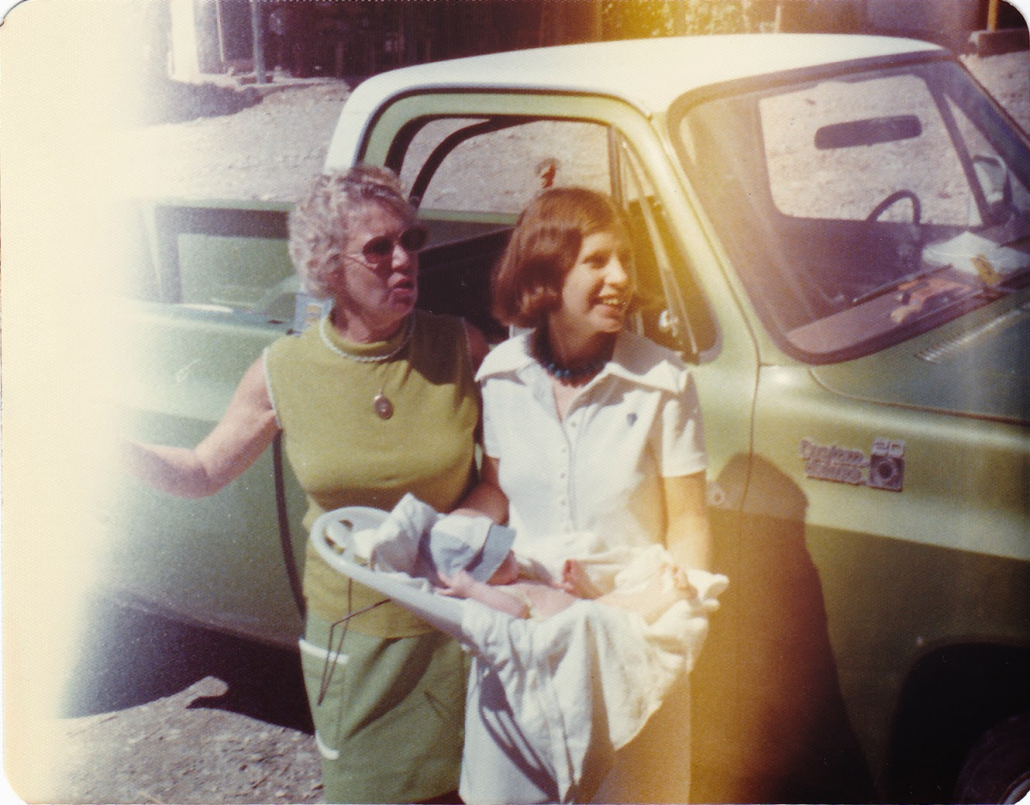
In Les Cayes, Haiti, with my mother and Aileen. 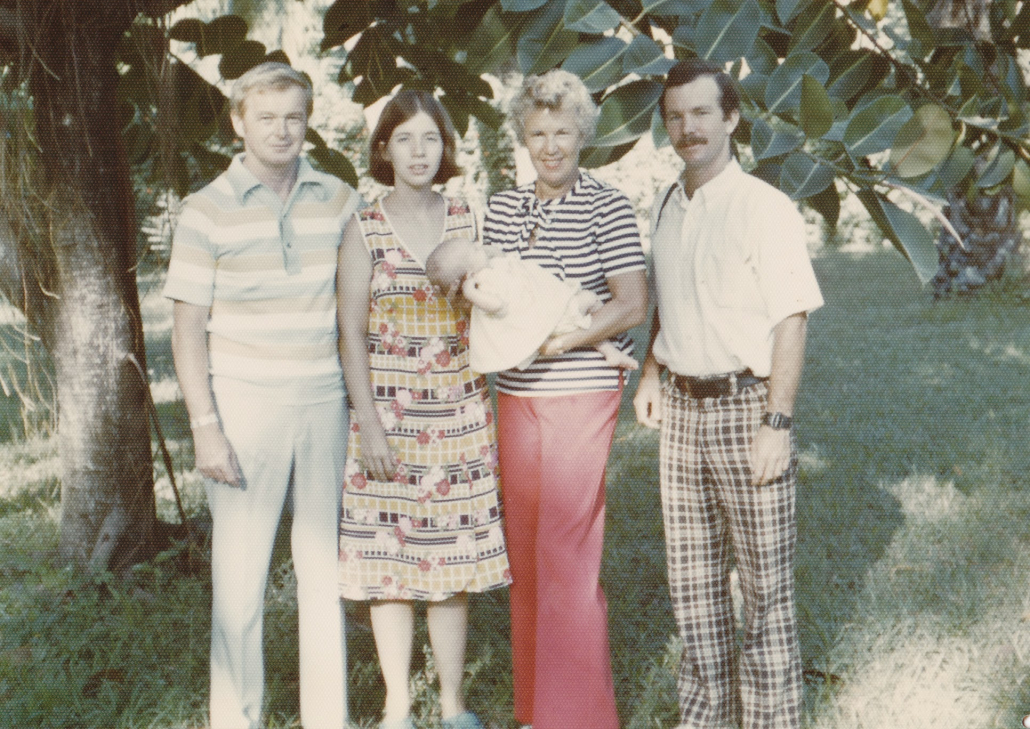
In front of our house in Les Cayes. 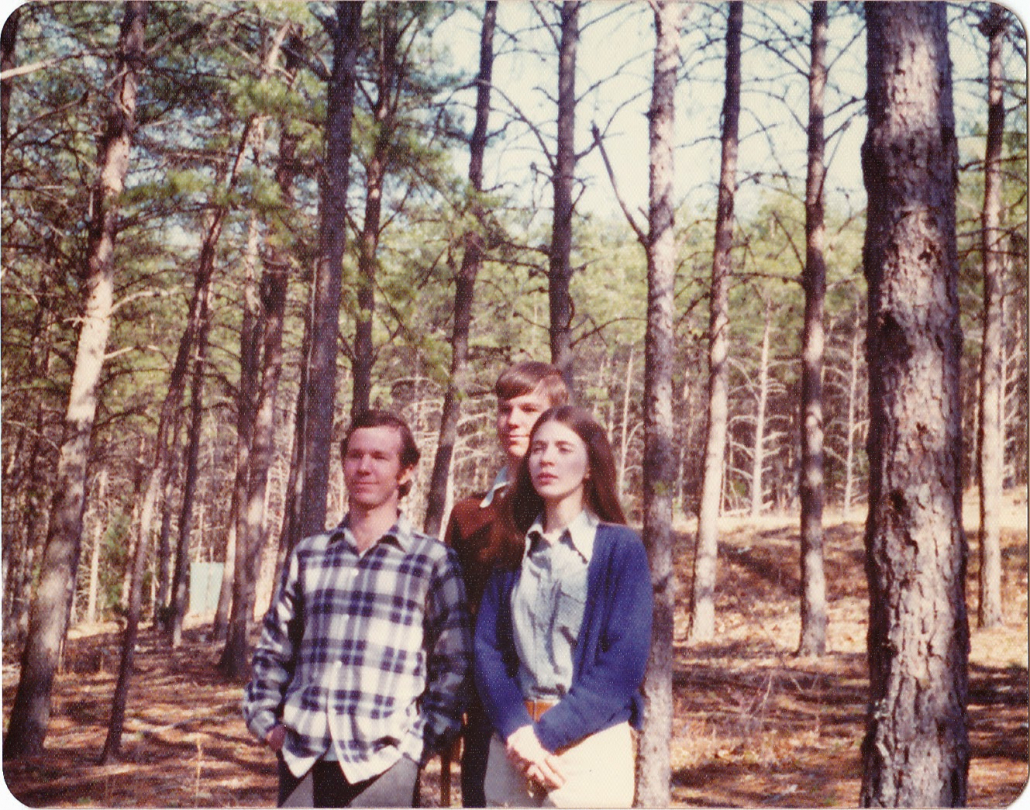
With Scott, visiting Bryce mountain home of Frank and Betty Hayes. 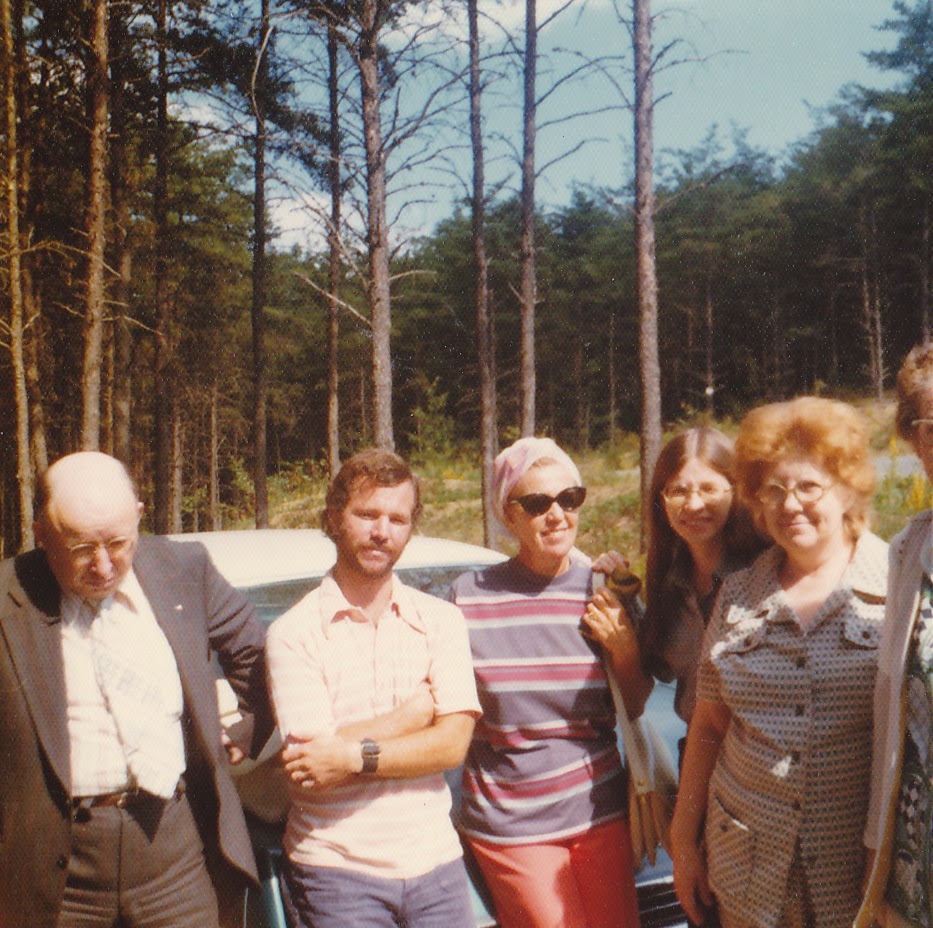
My mother, Frank and Betty, and Ralph’s mother, Catherine, barely visable on the right. 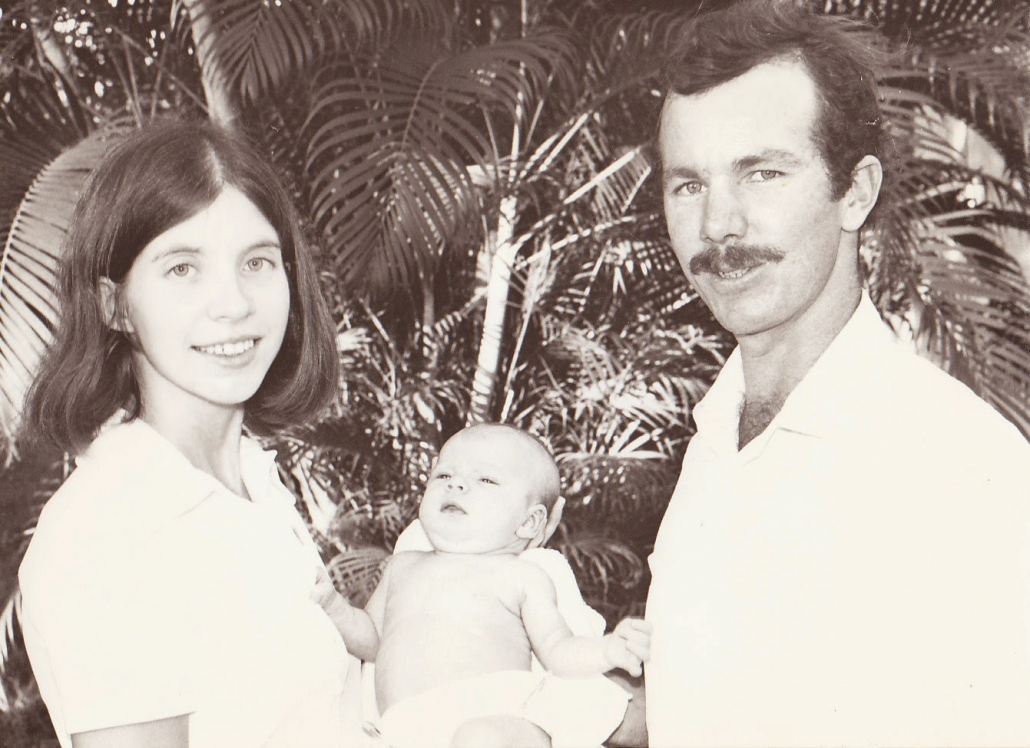
In Les Cayes, Haiti.
Like all of us, her character and habits were developed earlier in life. She was well known in the Baha’i community. She was not pro-active, she was more reserved, and she wanted to be a participant. When we decided to get married, one of the Persian Baha’is came to me and explained that this part of her character was special (Abbas I think his name was).
Such was the negative influence that her family contributed to the marriage, and the divorce. When I look back on this, the backbiting behavior originated in the Hayes family home. Betty and Frank Hayes lived together with the children, but there was no unity. Betty collected the children to her corner, figuratively, and she isolated Frank. It was not pleasant for me to see. I talked to Carolyn about it when we first met, and periodically until the death of Frank. In this family, the 3 sisters all played different roles. Cathy, the oldest, was self-important, opinionated, the leader. Jenny seemed to live in a different world. Carolyn was quiet. She didn’t compete with Cathy and she accepted her place in the family hierarchy. So hiding her opinion was learned with her mother and Cathy, not with Gary.
One incident comes to mind. Betty and Frank after Frank’s retirement moved to a new home in the mountains, and Carolyn and I thought it would a great place to meet and have a family reunion. So the details were discussed, with her sisters, and then…… Cathy decided it was too dangerous. She tried to convince Carolyn and Jenny that Frank was violent, had a gun, and he could kill them. I heard this and immediately said it was total nonsense. I said that Frank deeply loved all his daughters, and would never do anything to hurt them. Cathy argued (pushing Carolyn), insisting that he had a gun and he had threatened to kill Betty. I told them that, in my opinion, Frank was extremely unhappy and isolated. He was venting. I don’t doubt that he said: “I’m going to kill her.” It was totally clear that this was just Frank venting, and he had many reasons to feel anger about his isolation in the family and the behavior of his wife. The end of the story? Carolyn and I went to spend Christmas with the Hayes. Cathy stayed away.
Another story is the way Betty belittled Frank’s religious beliefs. Frank became a Mormon, and in my viewpoint, a serious, committed and believing Mormon. Betty disagreed with everything Mormon. So, although living in the same house, they created two lives, separate, and full of criticism of each other.
Carolyn grew up in this environment. Most of what I relate was never discussed among the girls. When I appeared on the scene and told Carolyn my observations, it was news to her. From her perspective, mom and the girls were united and fine and Frank did his own thing.
Why is Carolyn afraid to express her opinion? Why does she avoid any kind of conflict? Why does she hide her belief? I’m sure all this comes from her family of origin. She is intellectually capable, has good values, and is creative. But she lacks self-esteem and self-confidence. This behavior was well developed before she met me. She has to fit in. This is a great trait if not carried to extremes. I am saying nothing new. She has heard this many times from me, from others, and from guidance counselors during the sessions before our divorce. I am convinced in retrospect that she was attracted to me because of my healthy self-esteem and self-confidence. I was attracted to her quiet non-confrontational demeanor, and that she had demonstrated her Faith and values over the years.
In a book by Chimamanda Ngozi Adichie, “We Should All be Feminists”, she wrote: “What struck me…is how invested they are in being “liked.” How they have been raised to believe that their being likable is very important and that this “likable” trait is a specific thing. And that specific thing does not include showing anger or being aggressive or disagreeing too loudly. She is suggesting that this is typical for many women, African or American. I learned by experience that repressing Adichie’s “feminism” only causes natural feelings to appear “underground”. But although not on the surface, they are still expressed in other ways— just not openly. To this day, I am sure that Carolyn is motivated to be “liked.” This includes motherhood.
Our house after marriage. Carlos Castilla rigged a water bucket over the door, so when we arrived at 3 am in the morning, I send Carolyn ahead and picked up bags. Not very romantic I know. So she opens the door and gets drenched. Then, I rush in to see what happened. No lights. More precisely, no light bulbs in the entire house.
We attended the St Louis Baha’i Conference.
Frank loved his children and grandchildren; it is apparent to see.
I may be wrong, but I think this picture was taken in Seattle. I think the children were on the way to Maxwell Baha’i School. I was not there, but somebody gave Nabil (especially) the idea that we were sending him to Maxwell to get rid of him. Years later, he accused me of this, and I replied: “My goal in sending you to Maxwell was to establish a solid foundation for your life, both in this world, and worlds to come.” Raised as Baha’is, my children always participated in Baha’i activities during the time I lived with them.
This was the Baha’i community in Blacksburg when Carolyn arrived. We were very close to these friends and I miss all of them to the present day.
Regarding the divorce, Carolyn betrayed me when she ran away with the children from Sri Lanka. In fact, I reacted psychologically/physically to this event. I became clinically depressed, needed anti-depressants. Don’t confuse this with the colloquial term “depressed.” Clinical depression is a living nightmare. There was never any real reason for Carolyn and me to divorce. Carolyn gave me an ultimatum when we were separated. She would join me in the Netherlands. I said we needed more time. She rejected this idea and pressed ahead with plans to divorce. She didn’t believe that I would return to the marriage.
As Baha’i youth, we were both committed to the creation of a new world order, based on Baha’u’llah’s revelation. So, when she ran back to the states, she betrayed our initial agreement, our life plan, the goals and objectives that we created together– everything. It was hard for me to live with this betrayal.
I knew from the beginning that our characters and personalities were different. I, on one hand, have always expected everyone to express her or her feelings and desires, and to work out solutions through consultation. This was true in my personal life, and in my professional life. It turned out that this was a totally unrealistic expectation in the case of Carolyn. She could not do this. I did not see this in the beginning, but I knew there was something that didn’t mesh correctly. I think she probably also knew this. It was our achilles heel.
One pattern that repeated itself over and over on the road to divorce were dysfunctional consultations, first without the children, and then with the children, to discuss and make family decisions. Consultation was what we were taught in Baha’i workshops and deepenings. We believed that this was the best mechanism for family unity and growth and we should use it. Unfortunately, we did not have the skills to make it work. I blame Carolyn; she blames me. Our perspectives are different, and both are correct. By definition, we were both at fault. My oldest daughter became a player in this drama and this negatively impacted on her life and the life of her brother and sister.
Carolyn never learned to give her opinion, openly, in consultation. It was a kind of phobia. She was afraid to do it. I would ask her to talk, and she could not. Instead, she cried. I cannot say why she was afraid. Was she afraid of me? For what reason? I was loyal to her, I was loyal to the children, I never tried to hurt her.
My response to this phobia was wrong. I did not see it as a phobia at the time. I would get angry at her for not being able to give her opinion and not even trying to find an agreement. The more I wanted her to speak out, the worse the results– only more crying. The truth is that I wanted and needed her to speak out, and there was never an equal status in our relationship, and, that was unacceptable to me.
I did not want all the responsibility placed on my shoulders in the household. And, in fact, all of my character traits that led to Carolyn deciding to marry me were exactly the same character traits that ultimately climaxed in our divorce. It is perfectly normal to me, in retrospect, that instead of speaking out, Carolyn found other ways to solve problems— like listening to her sister and running away.
Cathy and Clint, Carolyn’s sister and brother-in-law, were major provocateurs in the divorce. They decidedly and openly worked against me, and I think anything Baha’i. Why the Baha’is? This was due to some incident in their lives when they were Baha’is. Carolyn and I heard that they had become Baha’is in Rhode Island, and were even appointed to a regional coordinating committee. This means that they were not only Baha’is, but they had achieved a certain recognition in the community. But, apparently, something negative happened, they withdrew from the Faith, and then in passive-aggressive ways, ways learned in the Hayes family by all the sisters, worked against me and the Baha’i Faith. To my recollection, I never had a crossword with either Cathy or Clint. However, their behavior towards me, and my marriage, was destructive and wrong. It is the responsibility of extended family members to protect the family unit, and the children. Perhaps they feel proud of their role in the divorce, but they should feel ashamed. The divorce did not have to happen, but they worked for years to break up the marriage and save Carolyn from her belief in Baha’u’llah. In this role, they had the support and complicity of Betty.
Is there any third party that can objectively see the marriage and understand the divorce? From the perspective of all our Baha’i friends in Sri Lanka, where we were both well-known and active, we lived an ideal life and had an ideal relationship. We were both Baha’i pioneers, devoted to the Cause, and successful in all our activities. For 5 years I was a member of the National Spiritual Assembly, and we worked to establish the Teaching Institute in Kadagannawa (near Kandy, where we invested significant family resources), Carolyn was also active in the renovation of the National Baha’i Centre and other initiatives. I was working in a USAID project and Carolyn taught– both using innovative homeschooling courses and at a school with the Irrigation Institute near Kandy. To me our children were happy, growing up in a wonderful environment, and all was going well. So, what went wrong? My guess– she didn’t want to pioneer anymore. She wanted to stay in North Carolina. But…she never said anything to me.
If I were to assess how Carolyn and I worked together, for the education of the children, both material and spiritual, and for the special care that we gave to the multiple problems of Aileen, I would give us excellent marks. No-one can understand the nature of this marriage without knowing the level of caring and efforts that we devoted to the multiple issues related to Aileen. Of her two serious issues, profound hearing loss and glycogen storage disease (GSD), the GSD was the worse. However, this should not be read to minimize the issues related to her deafness. In families that have just one of these problems, it is not unusual to see the parents end up divorced.
From the birth of Aileen until the time in Sri Lanka, my life with Carolyn centered around the needs of Aileen. The other children should not (did not) feel that they were neglected in any way, or didn’t receive all our efforts, but Aileen’s needs determined our priorities. We did what needed to be done. Without arguments, complaints, or gripping.

When this picture was taken, Carolyn called and said she was not returning to Kandy with the kids. It was a complete surprise, totally unexpected. 
At our home in Kandy 
Nabil’s birthday party at our home in Kandy 
Local Baha’i Centre in Kandy 
At the Baily home in Colombo. The Baily’s were our closest friends, and one year Nabil lived with them to go to school in Colombo. 
This is in our home in Cary, North Carolina. The girl behind Nabil is the next door neighbor, deaf like Aileen. 
Les Cayes, Haiti 
Visiting my mother in Colorado
Carolyn took the main role in the day to day activities, because, after all, I was working full time. Thus, we lived a typical pattern for many families. My job was to do the research, investigate options, plan activities, and support Carolyn. I never heard any complaints about this. I was always a full participant. If Carolyn was able to do all the necessary day-to-day activities, it was because she was given my full support and backstopping that gave her this opportunity. She didn’t and couldn’t do it all alone. This became obvious after the divorce when she started studying and dating, and the ideal mother was no longer so available, and the behavior and control of the children suffered. It made me appreciate the need for unified families, and to understand that single parents with 3 children have an impossible task.
From the perspective of the children: the divorce was an unabated disaster. Starting with Aileen. Aileen has always been very visual and observant of her environment. In Abidjan, before we confirmed her deafness, we saw something was not usual. She didn’t always react to sound! But, then, she would appear to react. Perhaps she spotted something in the corner of her eye, or a shadow. We even brought a doctor friend, with his tuning forks, and he didn’t make a conclusive diagnostic. Finally, one day I came home from work and Aileen was playing with the nanny close by, and with her back to the car. So I approached her quietly and leaned on the horn. And, guess what, no reaction whatsoever. So, a sound of 110 or more decibels, that would be painful to a fully hearing person, didn’t even register. Well, that’s when I said it’s time to go to get more adequate professional help. And, with the conclusion, it effectively terminated our Baha’i pioneering. I had found ways to manage her GSD (wasn’t easy), but I couldn’t get the needed help for the deafness. More about our life the Mississippi section of my memoir.
It is common that deaf people don’t get the same amount of auditory information as the fully hearing. But they are very visually observant. The other senses step up to compensate. She picked up on her mother’s crying and associated this with me. A reasonable conclusion. But what was not reasonable followed. She became my mother’s closest confidant, and she pushed for details like she can do, and Carolyn gave them, which she should not have done. Again, not a bad or unusual characteristic for Aileen to push for details. However, these details were explained to her, and she was too young to put them into context. And this started a desire to protect her mother from me, the father. From her limited perspective, mother cries, and this confirms that father is the reason— thus, father’s the problem. Simple.
I actually saw this taking place. To this day, Aileen will say she knew exactly what was going on and understood everything. You decide. Aileen was 12 years old. From my perspective, she judged adult themes relating to her parents like a 12-year-old with incomplete facts. Carolyn was not trying to play her against me. This was the beginning of the bad relationship between me and Aileen. But Aileen, much like her grandmother Shirley, does not give up on what she wants and what she thinks needs to be done.
When I saw Aileen’s interest and involvement in the events leading up to divorce, I understood that she was reacting to the tears of her mother and her mother’s unhappiness. I talked to Carolyn about this, and we searched for a better way to connect the tears with behavior. So, we agreed to discuss family matters in “family consultation.” We regularly met to discuss family decisions. And….still tears. The children repeatedly saw their mother start crying during the consultation. They did not see me being physically or emotionally abusive. In my simple mathematical linear thinking, this will demonstrate that their father is not causing the tears. Wrong. Mother’s tears are mother’s tears. No explanation removes that fact, however reasonable it may be.
Fast forward to the last days of the marriage, and an attempt to find a solution and save the marriage. We with the Local Assembly and a marriage counselor. Listening to the story, the marriage counselor suggested that Carolyn was placing me on a pedestal. I made it clear that I not only did not want to be there, but that this behavior prevented the normal growth and development of our marriage. This was discussed not in one session, but over a series of sessions. It was never questioned by Carolyn. I remember telling my children this one time, so they could understand my perspective.
Final chapter in the divorce. When I moved to the Netherlands, Carolyn and I talked about her joining me. She wanted to join me. I did not agree. I said we had to make some progress in leveling the relationship, or we would return to past habits. I wasn’t in a rush to divorce until a few months later, she accused me of not being open about finances. At the time, she had all my financial records and did my US taxes. So, I said, in that case, move ahead and we’ll legally sign the property agreement.
Carolyn couldn’t wait without the certainty that we would get back together. In retrospect, I should have agreed to a timeline. This would have been better for the children, and for all of us. But that didn’t happen.
Many more stories about Carolyn and my life with her and the children will be in other sections.
Not wanting to leave NC is an unsubstantiated hypothesis for development of problems in Sri Lanka. The more time goes by, the more I think it is true. She didn’t want to be an international Baha’i pioneer anymore. And I didn’t want any other life. This initial agreement that pre-dated our marriage, was no longer keeping us together.
This picture was taken after Carolyn and the children returned to Kandy. Perhaps Nabil was living with the Bayly’s at this time.
I flew to North Carolina, expecting to find Carolyn set against me, and moving into our Garner home. Instead, it was simply a reunion, and we simply planned our return to Kandy via Paris and Haifa. No one was more shocked than Diane and Arthur McKinley, where Carolyn was staying with the kids. What happened? I think I said it would be better if she returned to Kandy and she was free to make any decision that she wanted. She didn’t need to be convinced. My take: “She was pushed to abandon her husband.” It wasn’t her doing.
Aileen did not like my mother. She didn’t try to hide this fact. Tellingly, she always said I was like my mother. My interpretation, she didn’t like me either. I believe this is true. It started when it was a medical necessity for her to eat on a strict timetable. I was seen by Aileen to be authoritarian. I was following the doctor’s instructions, hoping to prevent permanent brain damage from a hypoglycemic convulsion that could not be brought under control. I lived with this fear 24/7 for the first decade of her life. We did not experience normal sleep. We positioned microphones to hear her breathing because we could tell by her breathing if a crisis was about to take place. Picture that, if you can.
Aileen’s graduation from college, a couple of years after the divorce, was the culmination of a lot of effort on the part of Aileen, and her parents. We believe that she has great potential— but at the same time, she doesn’t choose to use it effectively. God willing, she will. There is time yet.

